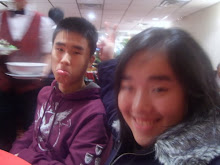I learned about McDonald's Made for You in my operation management class. The procedure, which McDonald's calls "Made for You," does away with its 43-year-old process of making sandwiches by the batch ahead of time and putting them in warming bins. Bigari's crews don't start filling an order until it's placed. "Made for You" also does away with McDonald's practice of discouraging special orders, lest they disrupt its fine-tuned assembly. If that's the case then my experience with placing a special order certainly was a huge disappointment.
So it was 2pm on Saturday when I arrived at McDonald's. It was packed with people and there were four people in line before me waiting to be serviced. It took approximately six minutes before they get to me. I noticed there were in total five staff working at the time. Two people works in the back responsible for food preparation while three people in the front taking orders for their own lines (there were three cash registers). Staff who takes orders also gives a hand to the kitchen crew to speed up the process when there are no one waiting on his/her line. When it was my turn to place the order, I told the person exactly what I want that is "1 small hamburger with 4 pickles and 1 small french fries well done with no salt". After that I requested that the exact order to be reflected on the receipt. However, the guy didn't get any of what I said because he was stuck on the four pickles part of my order. He had no idea how to register that kind of input so another staff came over and tried to help him but she had no idea as well. So she suggested that she will take my order again and correct the mistakes herself after the receipt is printed. As I was waiting for my order, a lady on the line next to me was requesting a special order for her son. I didn't quite remember what exactly was her requests but all I remember was the staff struggling with the order repeating the woman's order several times to make sure it was right.
When my order is done, the staff handed me the order as well as the receipt with corrections she made herself. However, when I open the bag to make sure everythings right. I noticed instantly there was something extra that I did not order in my bag. In the midst of trying to fulfill everyones order as fast as possible, the person who took my order accidentally included a part of someone else's order into mine and charged me for it. I know this because the customer next to me was asking for her McNuggets when it's in my bag. I paid for my order with my card so I didn't notice this mistake right away. On top of this, there are only two pickles on my hamburger when I specifically asked for four. The only part they got it right was the fries. I went back and told the person who took my order exactly what was wrong. She apologized right away to me and the other customer who's order ended up in my bag. Then she took the McNuggets from my bag and gave it to the other customer. In order to solve the problems with my order, she asked the kitchen to redo my hamburger this time with exactly four pickles and crossed out the extra McNuggets charge on my receipt as she return the extra dollar. As she handed my order the second time, she apologized several times for the mistakes.
I think the problem here with this management process is the inflexibility of the order taking process. This limits or discourage special orders which completely defeats the purpose of having a procedure called "Made for You". If the system does have inputs to accommodate special orders then that only goes to show that the employees are not well aware of it. If the staff who took my order are knowledgable in this area then the kitchen crew will get the exact order as I requested it and prepare it. Everyone should be prepared for special orders especially during rush hours. However I noticed that fast food restaurants are more willing to do special orders during off peak hours because everyone have more time on their hands. They focused too much on the speed that they sacrificed quality in the process.
As for the experience, I'm really not loving it.
